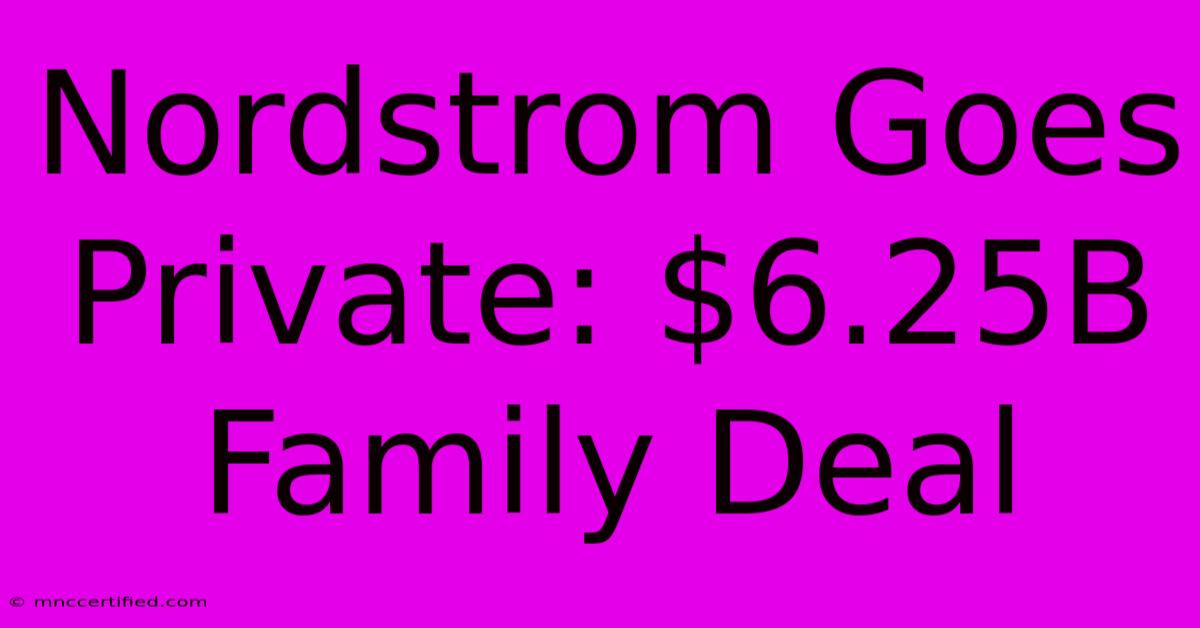Nordstrom Goes Private: $6.25B Family Deal

Table of Contents
Nordstrom Goes Private: A $6.25 Billion Family Affair
Nordstrom, a name synonymous with upscale department stores, is going private in a $6.25 billion deal orchestrated by the founding family. This significant shift marks the end of an era for the publicly traded retailer and raises several key questions about its future direction. This article delves into the details of this landmark transaction, analyzes its implications, and explores what this means for shoppers, employees, and the broader retail landscape.
The Deal: A Family Reunion
The Nordstrom family, through a consortium including its members and private equity firm, has agreed to take the company private. This represents a significant buyout, valuing the company at approximately $6.25 billion, including debt. The offer price of $52 per share represents a premium over the stock's trading price, signaling a decisive move by the family to regain control and chart a new course for the retailer. This decisive action underscores the family's long-term commitment to the Nordstrom brand and their belief in its potential for future growth.
Key Players and their Roles
- The Nordstrom Family: The driving force behind the deal, the family aims to restructure operations away from the pressures of quarterly earnings reports and public scrutiny. This allows them to focus on long-term strategic planning and investment.
- Private Equity Firm: While the specific private equity firm isn't publicly named in all sources, their involvement injects significant capital and expertise in navigating complex financial transactions and driving operational efficiencies.
Implications of Going Private: A New Chapter for Nordstrom
Taking Nordstrom private offers several potential advantages:
- Strategic Flexibility: Freed from the constraints of public markets, Nordstrom can pursue long-term strategies without the pressure of short-term financial results. This could involve significant investments in areas like e-commerce, supply chain optimization, or new store formats.
- Operational Efficiency: Private ownership allows for more streamlined decision-making and a focus on internal restructuring to improve efficiency and profitability. The family likely has a plan for modernization and potential cost-cutting measures.
- Reduced Public Scrutiny: Removing the pressure of quarterly earnings reports and analyst expectations allows Nordstrom to focus on its long-term vision without the immediate pressures of Wall Street.
However, there are also potential drawbacks:
- Limited Access to Capital: As a private company, Nordstrom will have less access to public markets for raising capital should future expansion or acquisitions be required.
- Decreased Transparency: Going private reduces transparency for shareholders and the public, potentially making it harder to assess the company’s performance and financial health.
- Potential for Increased Debt: The significant debt assumed as part of the leveraged buyout could put pressure on the company's financial performance.
What This Means for Customers and Employees
While the immediate impact on customers might be minimal, the long-term implications remain to be seen. The Nordstrom family has stated its commitment to the brand and customer experience. Potential changes may include:
- Investments in customer experience: This could lead to enhanced in-store experiences, improved online shopping platforms, and potentially more personalized services.
- Store closures and remodels: While the deal's immediate impact on stores isn't fully transparent, there's potential for store closures in underperforming areas and investments in updating higher-performing locations.
- Changes to employment: The transition to private ownership might lead to restructuring and potential changes within the workforce, although the family has emphasized their commitment to employees.
The Broader Retail Landscape: A Shift in Dynamics
Nordstrom's move to private ownership highlights a broader trend in the retail industry, where established players are adapting to changing consumer behaviors and competitive pressures. This signals a more consolidated and privately-owned retail sector.
Conclusion: A Pivotal Moment for Nordstrom
Nordstrom's privatization is a significant event with far-reaching consequences. The family's decision reflects a calculated bet on the long-term potential of the brand. While the future holds both opportunities and challenges, the company's transition to private ownership marks a pivotal moment in its history, setting the stage for a new chapter in its evolution. Only time will tell if this strategic move will ultimately benefit the company, its employees, and its loyal customer base. Further analysis and reporting will be necessary to track the long-term impacts of this $6.25 billion family deal.

Thank you for visiting our website wich cover about Nordstrom Goes Private: $6.25B Family Deal. We hope the information provided has been useful to you. Feel free to contact us if you have any questions or need further assistance. See you next time and dont miss to bookmark.
Featured Posts
-
Follow Santa Norad 2024 Live Tracker
Dec 24, 2024
-
Knicks Win Anunoby Leads Scoring Spree
Dec 24, 2024
-
Nfl Recap Packers Rout Saints 34 0
Dec 24, 2024
-
Embiid Ejected Two Techs Vs Spurs
Dec 24, 2024
-
Morrisons Customers Report Delivery Issues
Dec 24, 2024